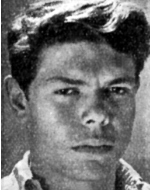Was born on April 19, 1928, in the village of Briozovo, northern Ural, in the Soviet Union, where his parents were exiled on charges of socialist Zionism. In 1930 he immigrated with them to Israel, when they were given permission to change their sentence by deportation from the Soviet Union. He grew up in the kibbutz of Hashomer Hatzair from the Soviet Union in the Kinneret courtyard and later in the settlement of Afikim. Itamar studied at the joint school in the Jordan Valley until the end of the following classes. In the higher grades, he was especially interested in the humanities. He often expressed his thoughts and thoughts on social questions and kibbutz problems, and his letters, notes and poems reached a high literary level. He was active in the Gadna and Hapoel branches in the Jordan Valley and in his home in Afikim, excelled in all sports, especially swimming, and did much to guide the children in the kibbutz. And in all of them excelled in coolness and courage. Was loved by all his friends and was an educator in the children’s society. He was also aware of the problems of youth and society at the time of his induction, and participated in clarifying these questions. In the service he was discovered to be a competent commander, concerned and responsible for his people, and focused on shaping their mood. According to his commander’s description, “he was the only one in his abilities who bore responsibility to many with great talent and was able to do much more …” As commander of a Palmach class, he participated in the operation of the radar on Mount Carmel on December 31, 1947 in Operation Balad al- (In retaliation for the murder at the refineries), in January 1948, in an attack on a gang base near Shfaram, and in March in an attack on the village of Kana, the bombing of a bridge near Jenin on the Jenin-Haifa road, ), In a battle with a gang on the Afula-Kfar Yehezkel road, in a quarry in the Zar’in area, and in an attack on the village of Qandala in the Jenin area. Upper Galilee and took part in a raid on a village in Lebanon and explosion Odessa Palace Ahmad Beck (end of May, the official war with Arab countries), occupation of kings, and later occupation of Al-Qubab way to Jerusalem. During the first break served as a company commander captain outpost Latrun. During Operation Danny, he participated in the conquest of Anaba, Jimzo, Barfilia and El Borg, and in the attack on Faluja. The courage, energy, and energy that they enjoyed were attached to his men, who liked and admired him. His desire was to study after the war at the university in order to add his knowledge to the development of his poetic and literary talent. When he was 20 years old, he was sent to the infantry officers’ school during the second truce, and by force of his influence the officers made great gains in conquering the Negev. From there he moved to the paratroopers’ camp in October. He passed a parachuting course, but in one of the parachutes, on the 14th of Mar, 1948, a disaster happened, his parachute did not open, he fell into the sea and his body was not found. In his assessment, as a man and as a man of the army, Yaffa pages were devoted to the “Ten” memoir of Kibbutz Afikim. For the first anniversary of the year, Hakibbutz Hameuchad published his book Nefesh and Tehum, which includes chapters from his estate. At Kibbutz Afikim, Beit Itamar was built, with a memorial room, a sports hall and a stage. A monument in his memory was erected in the military cemetery on Mount Herzl in Jerusalem. This fallen hero is a “maklan” – a hero whose burial place is unknown.
